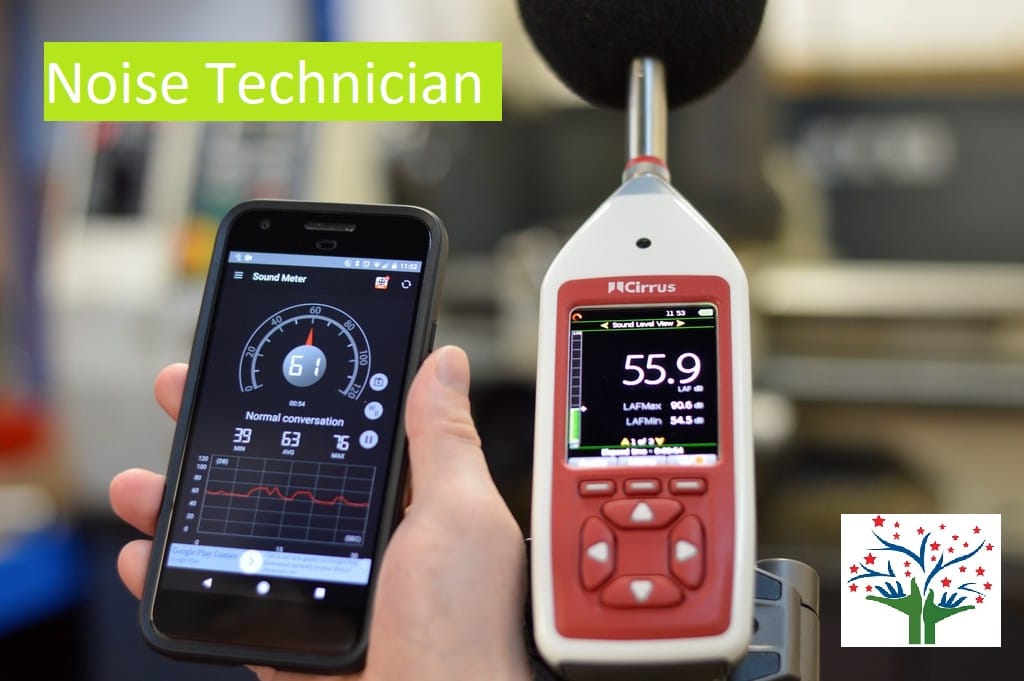Noise Technician – Roles, Salary & Courses
A noise technician is a professional who specializes in measuring and analyzing noise levels in various environments. Noise technicians work in a variety of industries, including construction, transportation, manufacturing, and entertainment. Their main responsibility is to measure and analyze noise levels to ensure that they do not exceed regulatory limits. Noise Technician also needs to verify that noises are not harmful to human health.
Roles and Responsibilities of a Noise Technician
The primary role of a noise technician is to measure and analyze noise levels in various environments. Using specialized equipment such as sound level meters, noise dosimeters, and octave band analyzers, the noise technician measures the sound pressure level (SPL) of noise sources.
The data collected is then used to determine if the noise levels exceed the permissible limits set by regulatory agencies, such as the Occupational Safety and Health Administration (OSHA) and the Environmental Protection Agency (EPA).
In addition to measuring noise levels, noise technicians may also be responsible for recommending and implementing noise control measures to reduce noise levels in the environment. This can involve identifying the source of the noise, designing and implementing noise barriers or soundproofing measures, and recommending changes to work practices or machinery to reduce noise levels.

Read more about Noise Level Monitoring and Testing
Qualifications of a Noise Technician
To become a noise technician, an individual typically needs a combination of education, training, and experience. A Noise technician should have high school diploma or equivalent and additional training in acoustics, physics, and instrumentation.
Some employers may also require a bachelor’s degree in a related field such as environmental science, physics, or engineering.
Training in the use of noise measurement equipment is also essential. This can include training in the use of sound level meters, noise dosimeters, and other specialized equipment.
Certification from organizations such as the National Institute for Occupational Safety and Health (NIOSH) or the Institute of Acoustics (IOA) can demonstrate proficiency in the use of noise measurement equipment and techniques.
Experience in the field is also important. Many noise technicians start in entry-level positions, such as a technician or assistant, and work their way up through on-the-job training and experience.
Some employers may also require experience in a specific industry, such as construction or manufacturing. It is to ensure that the technician understands the unique noise hazards and challenges in that industry.
Learn More about Noise Level Measurement Procedure
Tools Used by Noise Technicians
Noise technicians use a variety of specialized tools to measure and analyze noise levels. Some of the most commonly used tools include:
- Sound level meters: Sound level meters are handheld devices used to measure the sound pressure level (SPL) of noise sources. They typically consist of a microphone, a processing circuit, and a display screen. Sound level meters can measure noise levels in decibels (dB). It can be used to measure the overall noise level or the level of individual frequencies.
- Noise dosimeters: Noise dosimeters are worn by individuals to measure their exposure to noise over a period of time. They typically measure the average noise level over an eight-hour workday. It can be used to determine if workers are at risk of hearing damage due to prolonged exposure to noise.
- Octave band analyzers: Octave band analyzers are specialized tools used to measure the frequency content of noise sources. They divide the frequency spectrum into bands and measure the sound pressure level within each band. This information is used to identify the specific frequencies that contribute to noise levels. Also, to design effective noise control measures.
- Vibration meters: Vibration meters can help to measure the vibration levels of machinery and other equipment. Excessive vibration levels can cause noise as well as other problems such as equipment damage and worker fatigue.
- Computer software: Computer software can help to analyze noise data collected by sound level meters and other tools. This software can generate detailed reports on noise levels, frequency content, and other parameters.
Read: How to Measure Noise level at Workplace
Noise Technician Salary
Noise technician salary in India can range from 1.3 to 50 Lacs PA. Salary depends on degree and experience hold be Noise Technician.
Noise Technician Courses
We have identified few courses in case you want to become Noise Measurement Expert.
- Noise Management and Control by IIT Kanpur.
- Basics of Noise and Its Measurements, IIT Kanpur
- NOISE Measurement Course by CAOHC https://www.caohc.org/products/noise-measurement-course
- Certificate of Competence in Environmental Noise Measurement by Colchester Institute. https://www.colchester.ac.uk/course/environmental-noise-measurement/
- Noise & Vibration Analysis Methods (Basic & Advanced) by Central Manufacturing Technology Institute (CMTI)
- Noise – Measurement and Its Effects W503 by British Occupational Hygiene Safety https://www.bohs.org/education/qualifications/detail/w503-noise-measurement-and-its-effects/
